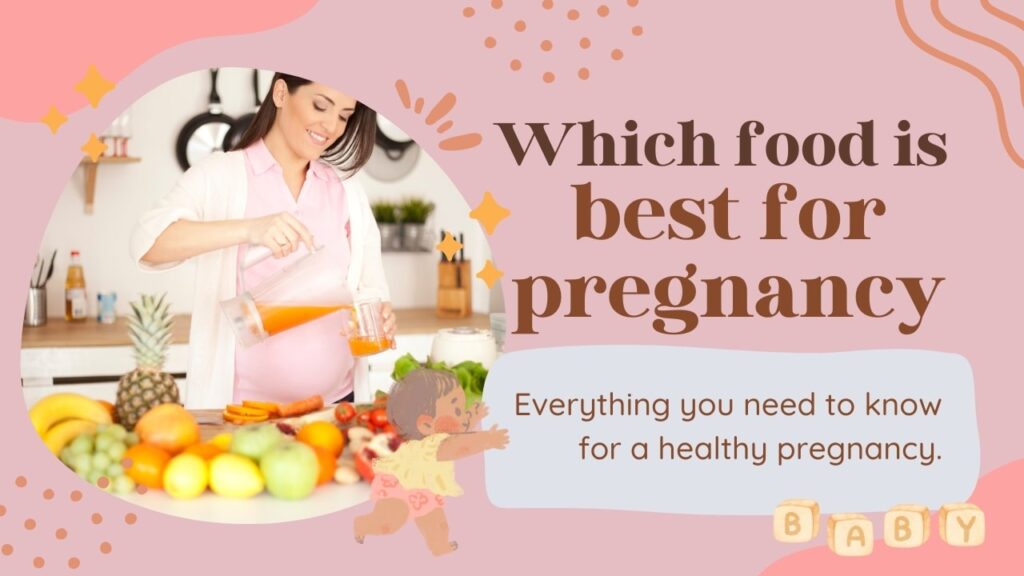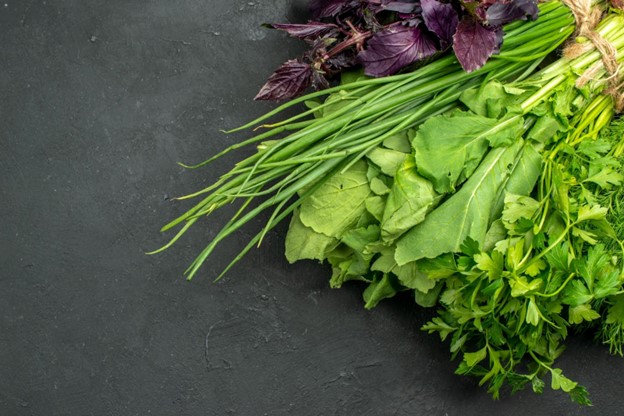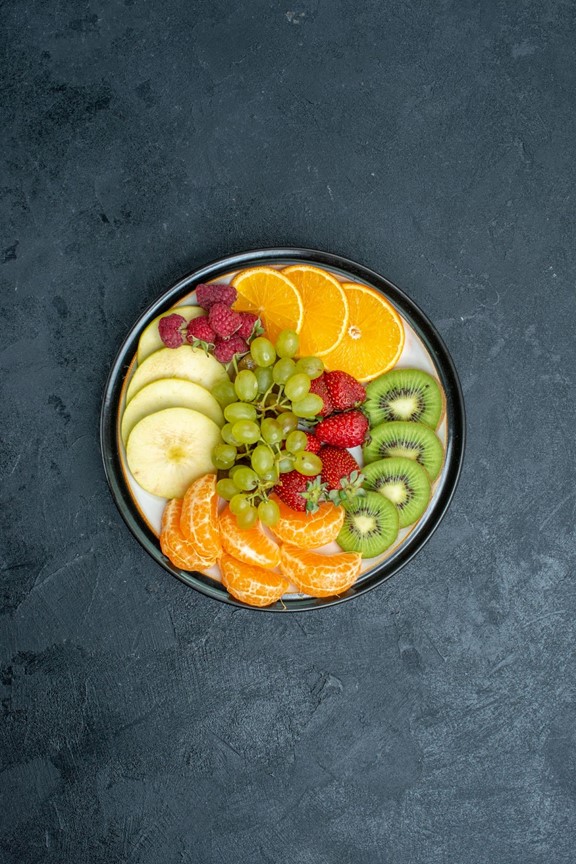Last updated on May 21st, 2025 at 01:22 pm
 Pregnancy is a miraculous journey marked by numerous changes, both physically and emotionally. Among the most crucial aspects of this journey is nutrition. The food you consume during pregnancy plays a pivotal role in ensuring the health and well-being of both you and your developing baby.
Pregnancy is a miraculous journey marked by numerous changes, both physically and emotionally. Among the most crucial aspects of this journey is nutrition. The food you consume during pregnancy plays a pivotal role in ensuring the health and well-being of both you and your developing baby.
The significance of proper nutrition during pregnancy cannot be overstated. It directly impacts the baby’s growth and development, as well as the mother’s overall health. Adequate nutrition helps prevent birth defects, ensures a healthy birth weight, reduces the risk of complications during childbirth, and supports postpartum recovery. Moreover, a well-balanced diet during pregnancy can alleviate common discomforts such as nausea, fatigue, and constipation, while promoting optimal maternal health.
Essential Nutrients for Pregnancy
- Folic Acid: Crucial for neural tube development and preventing birth defects.
- Iron: Supports the increased blood volume and prevents maternal anemia.
- Calcium: Vital for bone development in the fetus and maintaining maternal bone health.
- Protein: Essential for fetal growth and development of organs, muscles, and tissues.
- Omega-3 Fatty Acids: Support brain and vision development in the fetus.
- Vitamin D: Facilitates calcium absorption and supports bone health.
- Vitamin C: Boosts immune function and aids in iron absorption.
- Fiber: Prevents constipation and supports digestive health during pregnancy.
Best Foods for Pregnancy
During pregnancy, a woman’s body undergoes significant changes, and proper nutrition becomes paramount to support both maternal health and the optimal development of the growing fetus. Let’s delve into some of the best foods for pregnancy, along with ways to incorporate them into your diet and their associated benefits.
-
Leafy Greens (Spinach, Kale, Swiss Chard):
- Ways to Eat: Incorporate into salads, smoothies, stir-fries, soups, or omelets.
- Benefits: Rich in folate, iron, calcium, and vitamins A, C, and K. Folate helps prevent neural tube defects, iron supports the increased blood volume during pregnancy, and calcium aids in fetal bone development.

-
Lean Protein (Chicken, Turkey, Fish, Legumes):
- Ways to Eat: Grill, bake, or stir-fry lean meats; add beans or lentils to salads, soups, or stews.
- Benefits: Essential for fetal growth and development, protein also helps repair and build tissues in both the mother and baby. Lean protein sources are also low in saturated fats, promoting heart health.
-
Whole Grains (Brown Rice, Quinoa, Whole Wheat Bread):
- Ways to Eat: Replace refined grains with whole grain alternatives in meals such as rice dishes, salads, sandwiches, and breakfast cereals.
- Benefits: Rich in fiber, B vitamins, and essential minerals like magnesium and selenium. Whole grains provide sustained energy, aid digestion, and help prevent constipation, a common pregnancy discomfort.
-
Dairy Products (Milk, Yogurt, Cheese):
- Ways to Eat: Enjoy as a snack, incorporate into smoothies, oatmeal, or use in cooking and baking.
- Benefits: Excellent sources of calcium, protein, and vitamin D. Calcium supports fetal bone development, while protein helps with muscle and tissue formation. Vitamin D aids calcium absorption and promotes maternal bone health.
-
Fruits (Berries, Citrus Fruits, Apples, Bananas):
- Ways to Eat: Eat fresh as snacks, add to yogurt, cereal, or salads, or blend into smoothies.
- Benefits: Packed with vitamins, minerals, fiber, and antioxidants. Fruits provide essential nutrients like vitamin C, which boosts immunity and aids iron absorption, crucial during pregnancy.

-
Fatty Fish (Salmon, Trout, Sardines):
- Ways to Eat: Bake, grill, or steam fish fillets; add canned fish to salads or sandwiches.
- Benefits: Excellent sources of omega-3 fatty acids, particularly DHA and EPA, which are vital for fetal brain and eye development. Fatty fish also provide protein and vitamin D.
-
Nuts and Seeds (Almonds, Walnuts, Chia Seeds, Flaxseeds):
- Ways to Eat: Enjoy as a snack, sprinkle on yogurt, oatmeal, or salads, or use as toppings for baked goods.
- Benefits: Rich in healthy fats, protein, fiber, vitamins, and minerals. Nuts and seeds provide energy, support fetal development, and help maintain maternal health.
-
Legumes (Beans, Lentils, Chickpeas):
- Ways to Eat: Cook into soups, stews, or curries, blend into dips like hummus, or add to salads and wraps.
- Benefits: High in protein, fiber, folate, iron, and other essential nutrients. Legumes support fetal growth, aid digestion, and help prevent anemia and constipation.
- Incorporating a variety of these nutrient-dense foods into your daily meals and snacks ensures you’re meeting your increased nutritional needs during pregnancy. Remember to also stay hydrated by drinking plenty of water and to consult with your healthcare provider or a registered dietitian for personalized dietary recommendations based on your individual needs and preferences. By nourishing your body with wholesome foods, you’re providing the best possible start for both you and your baby.
Pregnancy Food Chart
Below is a sample pregnancy food chart to help you plan nutritious meals throughout your pregnancy. This chart is customizable based on individual dietary preferences and nutritional needs.
| Meal | Foods |
| Breakfast | – Whole wheat toast with avocado |
| – Scrambled eggs with spinach | |
| – Greek yogurt with berries and granola | |
| – Oatmeal with sliced bananas and nuts | |
| – Smoothie with spinach, banana, and almond milk |
| Whole grain cereal with milk and fruit | |
| Snack | – Apple slices with peanut butter |
| – Carrot sticks with hummus | |
| – Greek yogurt with honey and almonds |
| Trail mix with dried fruits and nuts | |
| Lunch | – Grilled chicken salad with mixed greens |
| – Quinoa and black bean wrap | |
| – Lentil soup with whole grain bread | |
| – Tuna salad sandwich on whole wheat bread |
| Veggie stir-fry with tofu and brown rice | |
| Snack | – Cottage cheese with pineapple chunks |
| – Whole grain crackers with cheese | |
| – Smoothie with spinach, mango, and yogurt |
| Handful of almonds and dried apricots | |
| Dinner | – Baked salmon with sweet potato and asparagus |
| – Beef stir-fry with mixed vegetables and brown rice | |
| – Stuffed bell peppers with quinoa and black beans | |
| – Lentil curry with whole wheat naan |
| Grilled tofu with broccoli and brown rice | |
| Dessert | – Greek yogurt with honey and berries |
| – Dark chocolate dipped strawberries | |
| – Homemade fruit sorbet |
Conclusion
Your diet during pregnancy lays the foundation for your baby’s health and development, as well as your own well-being. By focusing on nutrient-dense foods and maintaining a balanced diet, you can ensure optimal outcomes for both you and your baby. Remember to consult with your healthcare provider or a registered dietitian for personalized dietary recommendations tailored to your specific needs and preferences. Embrace this transformative journey with nourishment and care, as you prepare to welcome your little one into the world.
FAQs On Which Food Is Best For Pregnancy?
1. Which Food Is Best For Pregnancy?
Answer: The best foods for pregnancy include nutrient-dense options like leafy greens, lean proteins, whole grains, dairy products, fruits, and fatty fish. Incorporating these foods into your diet supports fetal development, ensures maternal health, and helps alleviate common pregnancy discomforts.
2. What are the best sources of folate for pregnancy?
Answer: Folate, a crucial nutrient for fetal development, can be found abundantly in leafy greens such as spinach and kale, as well as in fortified cereals, citrus fruits like oranges, and legumes like lentils and chickpeas. Incorporating these foods into your diet ensures you meet your daily folate requirements, reducing the risk of neural tube defects in the developing baby.
3. How can I incorporate enough protein into my pregnancy diet?
Answer: Lean protein sources such as poultry, fish, eggs, tofu, and legumes are excellent choices for meeting increased protein needs during pregnancy. Incorporate these foods into meals and snacks throughout the day, aiming for a balanced intake to support fetal growth and development while also maintaining maternal muscle and tissue health.
4. What are some healthy snack options for pregnancy?
Answer: Healthy snack options during pregnancy include fruits like apples, berries, and bananas, Greek yogurt with nuts or seeds, whole grain crackers with cheese or hummus, and vegetable sticks with guacamole or cottage cheese. These snacks provide essential nutrients like vitamins, minerals, protein, and fiber, helping to sustain energy levels and curb hunger between meals while promoting overall maternal and fetal health.
Also Read:-